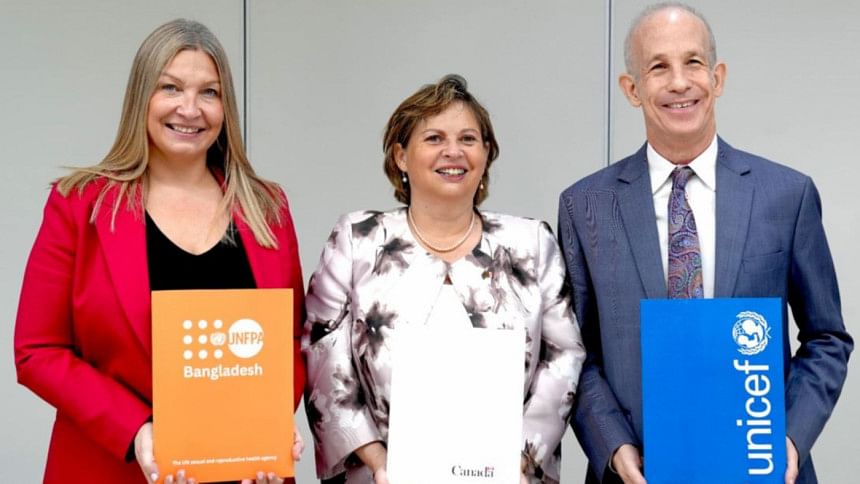Unicef, UNFPA, Canada join hands to improve Bangladesh's healthcare system

Unicef, UNFPA, and Canada have partnered to support Bangladesh with a five-year project to improve the country's primary healthcare system, significantly reducing maternal and child mortality, and enhancing health services in its underserved regions.
The project, titled "Health System Strengthening for Primary Health Care," also aims to address critical gaps in the healthcare system while promoting gender equality and access to quality health care.
In a press release today, Unicef said despite progress over the past decade, maternal mortality in Bangladesh remains a significant concern. But the country has yet to achieve the Sustainable Development Goal of reducing maternal mortality to 70 deaths per 100,000 live births by 2030, which is now 136 till 2023.
Through the Canadian-funded project, over 1.9 million women of reproductive age, including two-thirds who are adolescent girls, and nearly 6 million children, including newborns and those under five years old, will gain access to essential healthcare services, the press release said.
Canadian High Commissioner Lilly Nicholls said the project aims not only to improve health outcomes in five underperforming districts but also to strengthen health systems through better planning of budgets and human resources and improved quality of care.
According to Unicef, adolescent girls remain at greater risk due to high rates of early marriage, gender-based violence, malnutrition, and a lack of sexual and reproductive health services. Alarmingly, 35 percent of births still occur at home without skilled care, increasing risks for both mothers and newborns.
Sheldon Yett, Unicef Representative to Bangladesh, stated, "Reducing maternal mortality has proven difficult. Our joint work will directly address the root drivers of this critical SDG for women's health."
Kristine Blokhus, UNFPA Representative to Bangladesh, said, "The SDG on maternal mortality is achievable in Bangladesh, but this requires our concerted efforts to ensure that every pregnancy is wanted, and every childbirth is safe. With this project, we will collectively support the government health system."
The project also focuses on addressing environmental impacts and reducing biomedical waste, aligning with UNFPA's green procurement strategy and UNICEF's commitment to sustainable development. The project will involve local communities in health planning and delivery, creating more accountable and responsive health services.
Key aspects of the project include strengthening healthcare systems and enhancing the capacities of the Ministry of Health and Family Welfare at national, district, and local levels, the press release said.

 For all latest news, follow The Daily Star's Google News channel.
For all latest news, follow The Daily Star's Google News channel. 



Comments